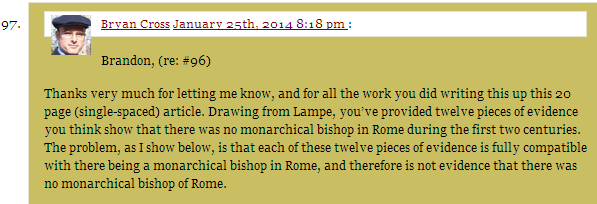I’ve left the following in response to his comment at the Called to Communion thread where this discussion is going on. He has rejected the following comment (which is identical to what I’ve posted in the comments here):
Bryan, in comment #97, you say:
Drawing from Lampe, you’ve provided twelve pieces of evidence you think show that there was no monarchical bishop in Rome during the first two centuries. The problem, as I show below, is that each of these twelve pieces of evidence is fully compatible with there being a monarchical bishop in Rome, and therefore is not evidence that there was no monarchical bishop of Rome.
[I said]: This is a mischaracterization of Brandon’s entire piece. It is a subtle mischaracterization, though, and it coheres with my claim that it is your method to selectively utilize the tactic of “mental reservation” to make your points for you.
My thought is that you are portraying it this way so that someone unthinkingly will read your response (without reading Brandon’s treatment) and thus come away with the thought, “Bryan has resoundingly refuted Brandon”.
However, I believe Brandon is correct when he states “In all due respect (and I do have much respect for Dr. Cross), Dr. Cross demonstrates his ignorance of Lampe’s book throughout this entire comment.”
You miss the whole thrust of the work.
No one of the “twelve pieces of evidence” is offered as “evidence there was no monarchical bishop in Rome”. Rather, it is the aggregation of these (and other) points that again, are not intended to show “it is incompatible” (in the sense that you use this word) with the notion that “with there being a monarchical bishop in Rome, and therefore is not evidence that there was no monarchical bishop of Rome.
Lampe’s work is in fact an extended argument – each item analyzes in detail one piece of the puzzle that, in aggregate, is not an attempt to prove there was no monarchical bishop in Rome, but instead was to create a positive picture of what the church at Rome was actually like. It is that overall picture itself which itself makes it very highly unlikely that there was a monarchical bishop in Rome.
Here is how Brandon puts it, right at the beginning:
This review is an attempt to show Peter Lampe’s entire argument for fractionated Roman Christianity. This “fractionation” that Lampe argues for is that through the end of the second century Roman Christianity was divided between many small cells that lacked central coordination. This basic thesis informs every part of Lampe’s book and each of the six sections seeks to further demonstrate why Roman Christianity is fractionated and how fractionation impacted Roman Christianity. The reason such a lengthy review is going to be undertaken is because in order to understand one section or sub-section adequately requires familiarity with all of the various pieces of evidence. Lampe himself states about the evidence:
We face a tour through a variety of material: literary materials, above all, but also epigraphical and archaeological ones are at hand, which often only become illuminating in combination.
Analyzing one part of Lampe’s argument in isolation (particularly concerning church government) risks an unbalanced assessment of Lampe’s work.
In reality, for you to address Lampe’s argument (and he makes just one argument through the course of the book), you would have to deal with the entire work, and debunk the various historical points he makes not by argument (“therefore, this one piece of evidence is not incompatible with there being a monarchical bishop in Rome, and therefore is not evidence that there was no monarchical bishop of Rome”), but by addressing specifically the literary and historical information he presents. You fail to do this throughout.
Instead, you look at each individual tree and say, “no, that’s not a forest … no, that’s not a forest …”
Either you do this intentionally or unintentionally. It can’t be because you are lazy. You clearly are not.
And if you were genuinely as intelligent as everyone thinks you are, you would know that you are doing this, and you would, in fact, avoid doing such a thing. Unless doing so would force you to come to the conclusion that Lampe really is correct in his conclusion.
In reality, your response does precisely the thing that Brandon (and Lampe) cautions against in the beginning of Brandon’s article.
Therefore, I’m led to believe you are being intentionally deceitful.
This example is as clear as can be to me, of how Bryan Cross operates. We live in a celebrity culture, and Bryan is something of a celebrity among Catholic converts and Catholic convert wannabees. They think he is smart and flawlessly logical.
Here we see an instance of the tactic he uses. How much of this sort of thing will we find in his other writings?


Regarding the title of your post, does your multiple choice test include "all of the above"?
ReplyDeleteI suppose that's a possibility.
DeleteI was giving him the benefit of the doubt ;-)
Delete